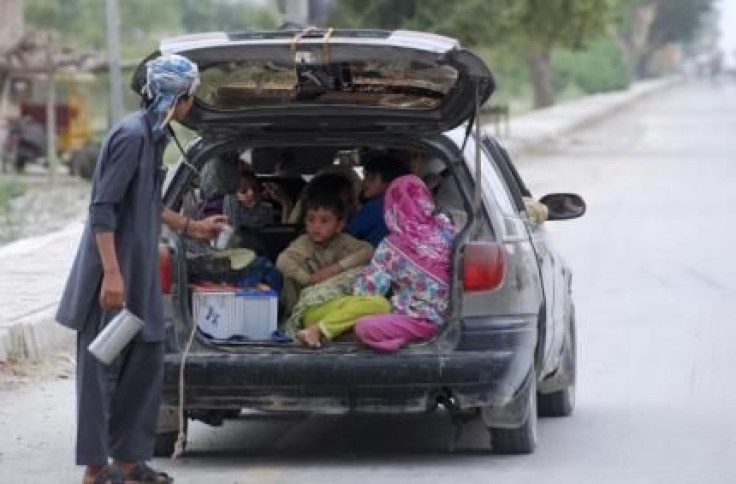Pakistan Fighting Reverses Flow Of Refugees, Stirs Unease In Afghanistan

KHOST Afghanistan (Reuters) - Thousands of refugees fleeing an offensive by Pakistan's army have poured across the lawless border into ramshackle camps on rugged hills in Afghanistan, stirring unease that Taliban militants may be hiding among them.
The mass departures over the porous border, which many in any case do not recognize, mark a change. For the first time in more than 30 years beleaguered residents are escaping into Afghanistan and not out of it, an irony not lost on local officials or refugee agencies.
Authorities in Khost province are offering a warm welcome and what little they have to shelter the newcomers. But intelligence officers and the army are uneasy -- some refugees from North Waziristan province could be Islamist activists of the Pakistani Taliban, the target of Pakistan's offensive.
"These communities for decades have been the ones benefitting from support from tribal communities in North Waziristan when they had to flee," said Bo Shack, the top official in Afghanistan of the U.N. High Commissioner for Refugees.
"Today they want to provide these families with equal help."
Refugees poured over the border in the other direction after Soviet troops invaded Afghanistan in 1979. More followed after Moscow's pullout a decade later sparked mass disorder and still more fled after Afghanistan's own Taliban took power in 1996.
Some 3.8 million Afghans have returned to Afghanistan since the Taliban were ousted by a U.S.-led coalition of forces in 2001 while 1.6 million remain there as refugees.
Circumstances are now different.
The Pakistani Taliban, stronger and more audacious but with few aims in common with their Afghan brethren, last month attacked Pakistan's largest airport outsideKarachi. The military, weary of negotiations, told residents in the Taliban's Waziristan stronghold to get out in advance of a crackdown.
A two-week bombing campaign gave way to a ground offensive. Pakistani officials say all civilians have left and anyone still there is classed as a militant.
The governor of Khost province applauded the hospitality of Afghan border villages last week at a gathering of Afghan officials and U.N. representatives at the refugee camps.
"People displaced from the other side of the border are our friends," said governorAbdul Jabbar Naeemi. "People are trying to help families, even though they themselves haven’t much."
Mohammad Akram Khpalwak, the minister for tribal and border affairs, promised help: "We will not give them weapons. We will help give them education."
The NDS intelligence agency, on guard against attempts by the Afghan Taliban to stage armed attacks to dislodge the Kabul government, is less sanguine.
"The NDS and the governor believe the Taliban have infiltrated the camps with weapons and could use them at any time," said a security official at the camps, declining to give his name. "Most of the families belong to the Taliban and will cross back if an operation starts here."
Each country accuses the other of harboring militants.
TENTS ON THE HILLS
Hundreds of white U.N. tents extend across rolling terrain dotted with sparse vegetation, with refugees putting up colorful drapes to create makeshift courtyards and a modicum of privacy. The U.N. says around 77,000 are in Khost.
Ration packages stacked in tents are, like everything else, covered in dust. Children run everywhere, with toddlers scratching about in the dirt like hens.
Mothers look on from shade, some in patterned headscarves, while others drift across the camp in black head-to-toe burqas.
Mahir Khan, who fled North Waziristan with her husband and 10 children, said the family made a living from farming. Trapped between the impending offensive and pledges by the Pakistani Taliban to fight back, she saw little choice but to leave.
"We came here because of the fighting," she said, children in different colored dresses gathered at her feet.
"The government warned us of a military operation. The Taliban also warned us, 'We are going to fight and if you get hurt it will not be our responsibility.'"
Achtar Marjana, an elderly women with leather-like skin, said her family had two days to get out. "We were forced by the government to leave with two days' warning," she said. "Apart from this tent, we have not received anything."
Khost has long been a concern for Afghan forces and the NATO troops bolstering them. In 2009, seven U.S. Central Intelligence Agency officers were blown up at their own base by an Al Qaeda mole, the deadliest attack on the agency in 25 years.
And it was here last month that U.S. serviceman Bowe Bergdahl, held by the Taliban for five years, was handed to the United States in exchange for five prominentTaliban detainees.
© Copyright IBTimes 2024. All rights reserved.











